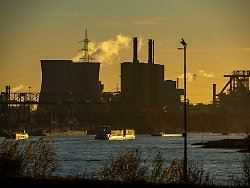Saturday 20th November 2021
Report on the settlement agreement
Traffic light is to plan gas phase-out by 2045
According to a media report, the Ampel coalition plans to say goodbye to another energy source by 2045 at the latest. In the coalition agreement, the exit from gas is to be anchored – a technology that is seen as a fossil bridge to purely renewable energy generation.
According to a media report, the SPD, Greens and FDP have agreed to phase out energy generation through gas by 2045 at the latest. As the “Wirtschaftswoche” reports, the negotiators of the future traffic light government agreed that the phase-out may even be brought forward to the year 2040, “if that is technically feasible”.
The reason for the planned step is that the goal of CO2 neutrality cannot be achieved otherwise. After the phase-out of nuclear energy and the decision to phase out coal, another energy source will be eliminated for the foreseeable future. So far, the coal phase-out is planned for 2038 at the latest; the Greens are pushing in the coalition negotiations to bring it forward to 2030.
The decision to keep gas as a transition technology until 2045 comes at the time of a dispute in the EU about which forms of energy should be classified as “green technology”. In the ongoing coalition negotiations, the Greens insist that both nuclear power and gas are not recognized as sustainable technologies. The federal government in Brussels must campaign for this.
The SPD takes a softer position: “We will continue to work to ensure that nuclear power is classified as unsustainable.” The SPD and FDP do not want to criticize bridging technologies – that is, gas – as dirty. On the other hand, the Greens, who are under pressure in their own ranks, to push through more of their own points in terms of climate protection.
The “Wirtschaftswoche” quotes a representative of Zukunft Gas eV, an interest group of the gas industry, in relation to the decision to phase out gas by 2045. Naturally, he is critical of the move: “We need security of supply, but we cannot have it without gas,” argues Peter Meyer. Most of the apartments and houses in Germany are heated with gas, and industry continues to rely on gas as an energy source. “We’ll need the gas for a very long time,” says Meyer.
